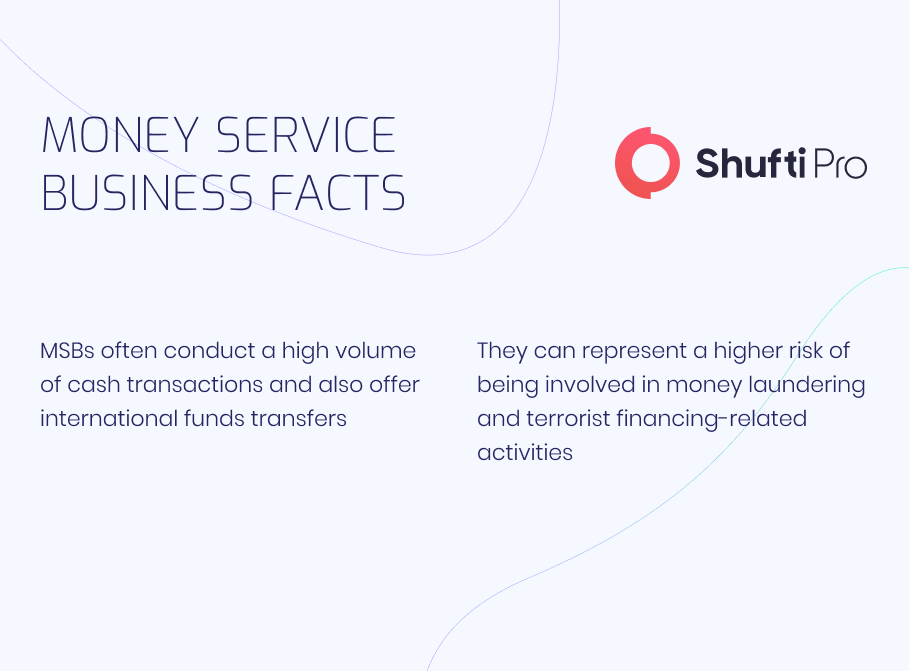AML Compliance for Money Service Businesses (MSBs) – How Shufti’s AML Screening Helps

Money laundering has spread like a virus in today’s globalized society. Banks and other financial institutions have been hit hard by financial crime, putting businesses in danger. Money service firms, or MSBs, seem to be the new means through which criminal organizations move money within and across nations. To guarantee that MSBs are taking all reasonable steps to prevent crimes, regulations are becoming more stringent.
Although MSBs have no intention to engage in criminal activities, ensuring AML compliance is a difficult task. The manual procedure of client identification and verification, which is rife with errors, only serves to exacerbate the cost of compliance staff and friction during onboarding. That being said, non-compliance is not an option and could cost MSBs their reputations along with hefty fines.
What are Money Service Businesses?
A firm or individual that deals in the transmission and conversion of money is known as a money service business (MSB). The phrase “money service business” is used to set money transmission and exchange businesses or individuals apart from full-service banks.
The Inland Revenue Service (IRS), which oversees more than $1 trillion in annual transactions in the USA, distinguishes between money transmission and money conversion MSBs. Companies that perform conversion services include those that cash checks, exchange foreign currencies, sell prepaid or stored value items, and more. If these businesses convert more than $1,000 per person per day across one or more transactions, they are classified as MSBs. Regardless of the amount involved, money transmission businesses or individuals are nonetheless considered to be MSBs.
Banks cannot be considered MSBs, as these are businesses that can be involved in e-commerce, cryptocurrencies, crowdsourcing, travel funds, etc. The many categories of companies that fall under the MSB category have been listed by FinCEN. These include companies that offer cash checks, issue money orders, deal in stored value products, sell or redeem money orders, transfer money, as well currency exchange services for any foreign currency, crypto, or stablecoins. As per FinCEN, banks (as defined in 31 CFR 1010.100(d)) are not money service businesses as they follow their own regulations. Similarly, an individual or entity that is registered with and regulated by the Commodity Futures Trading Commission or the Securities Exchange Commission is not considered an MSB.
The Emergence of MSBs
The way people utilize banking services and money has evolved dramatically since the advent of the internet. The demand for international money exchange services has boosted the MSB sector’s prevalence.
Currently, there are more than 25,000 MSBs registered in the US, and that number is rising. Check cashing businesses like Moneytree or ChecknGo were once referred to as “money service businesses.” Through these businesses, anyone could cash checks without having a bank account. The companies that provide financial services to the labor market have changed along with it. This is very common in the gig economy. Companies like PayPal, Rimuut, Toggle, and Stripe all make it easy to send money throughout the world to pay contractors.
Through websites like Transferwise and Western Union, money can be transferred between other currencies. The need for travel money services is also very strong. Traveling in the twenty-first century is made possible by foreign exchange services that provide global cash currencies and prepaid travel cards from Caxton and Revolut.

AML Compliance in MSBs
Legal requirements for MSBs are directly dependent upon the area or jurisdiction where the company is registered. They fall under anti-money laundering (AML) regulations and must have strict AML controls to counter illicit financing activities. While the regulations vary from place to place, the general requirements are the same. MSBs in the USA are obliged by the Bank Secrecy Act and need to register with the FinCEN. The registration of MSBs does not have lifetime validity and requires renewal every two years. MSBs in the UK need to register with HMRC to operate as AML-supervised businesses.
MSBs that fall under the category of money transmission businesses are also required to follow the Payments Regulation 2015 and the Payment Services Regulations 2017. Information relevant to fund transfers must be reported by the MSBs in this category. When it comes to AML requirements, both the US and the UK impose similar regulations for MSBs. As money is transferred to and from money service businesses at a fast pace, preventing money laundering and other types of financial crimes is of utmost significance. In particular, money service businesses that deal with foreign currency exchanges need to take preventive measures as they are the most susceptible to money laundering.
What MSBs Must Do to Comply
Putting an end to money laundering in such companies requires the implementation of a robust AML compliance regime. This implies that the MSB has to perform identity verification to get better oversight of its customers and their information. In the process called Know Your Customer (KYC) which is implemented by traditional banks and insurance companies, there are steps to identify and mitigate the risks of identity fraud and financial crime. The process also includes identifying the red flags of money laundering and reporting suspicious transactions to the relevant authorities. This includes transactions exceeding the threshold of $10,000 in the US or 10,000 EUR in Europe.
As per the Banking Secrecy Act in the USA, MSBs are required to assign an individual or a team to ensure that AML compliance programs are being implemented effectively.
MSBs must also provide training to their AML compliance professionals and all the staff members involved in the operations. MSBs are also required to carry out independent audits to evaluate their AML compliance measures. Considering the requirements for record-keeping, MSBs are required to maintain information in a way that is easy to find in the case of audits.
What Shufti Offers
Money service businesses like any other financial institution are required to comply with international and local regulations. Compliance for banks is becoming easier as they standardize their operations. However, there MSBs still need to catch up and develop the same level of compliance.
Shufti’s Anti-Money Laundering (AML) screening allows insurance firms to stay compliant with regulatory standards as well as prevent money laundering. Powered by thousands of AI algorithms, Shufti’s AML screening solution also screens customers against 1700+ global watchlists in less than a second with 98.67% accuracy.
Want to learn more about our AML Screening solution for your insurance firm?

 Explore Now
Explore Now













